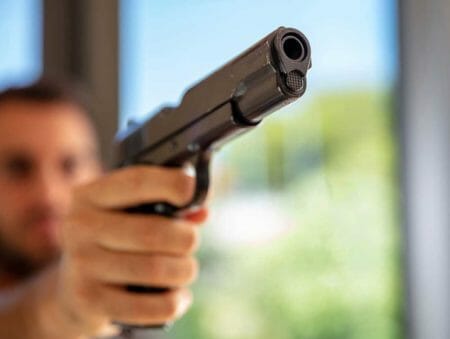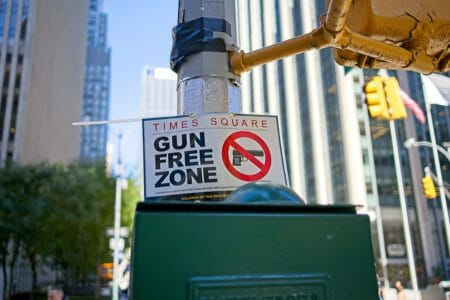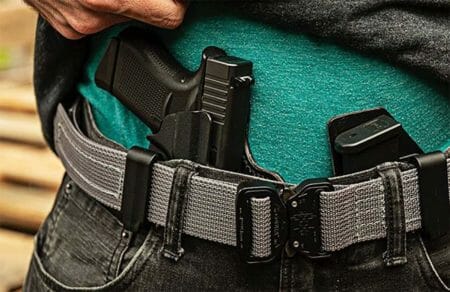A Matter Of Perspective when Citizens Choose Guns for Self Defense
© by Gary Marbut, President
Montana Shooting Sports Association
Author, Gun Laws of Montana


Montana – -(AmmoLand.com)- It is a matter of record that too many members of professional law enforcement, especially administrators, simply do not trust citizens to be armed and enabled to defend themselves from criminal attack.
Notwithstanding this too-common attitude among some law enforcement administrators, many street cops understand that they can rarely be present to stop a criminal attack — to interpose themselves between a criminal and his intended victim — no matter how they sincerely wish to protect people.
Why do some police administrators distrust armed citizens?
Do they seek a monopoly of force to build their bureaucracies by creating a “protection racket”? Dr. Sarah Thompson reminds us of the phenomenon of “projection” that we all learned about in Psych 101, and believes many who oppose firearm ownership do so because they project their own psychological instabilities onto the rest of us. Could projection be the primary motivator for law enforcement administrators’ opposition to citizen empowerment to reject victimization by being armed? Or, do they fear that the sheer volume and intrusiveness of the laws they are tasked to enforce will become insufferable to armed people?
Certainly there is a different perception of the armed citizen by firearm opponents than by the armed citizens themselves.
Consider only the language used by each. Those who object to firearms in civilian hands call self-loading rifles “assault weapons,” while the owners of these firearms call them “sport utility rifles” or “homeland defense rifles.”
There is no doubt that police administrators view citizen self defense from a unique perspective. Everyone sees the world from a unique perspective. Police administrators perceive the world from their unique point of view as full-time participants in the criminal justice system.
This unique perspective is influenced primarily by three factors:
- The clientele they deal with are not a cross section of the population. The people subject to their work are primarily ne’er-do-wells of one sort or another, conditioning some in law enforcement to grow to believe that anyone not a police officer and not in jail just hasn’t been caught yet committing his or her special crime.
- Their peer associations tend to be limited to their narrow circle of co-workers, so they don’t have the level of everyday exposure to usual citizens that those not in law enforcement have.
- Their mission has changed. The primary mission of the people hired to wear badges and guns used to be to keep the peace in the community, and to prevent the strong and mis-intended from preying on the weak. They were called “peace officers.” Their title has gradually changed and they have come to be called “law enforcement personnel.” Along with that change in descriptor has come a change in mission. Their primary mission has come to be enforcement of government edicts of one sort or another.
These and other factors causes those overseeing the “thin blue line” to perceive very differently those people who do not wear uniforms but do have firearms, perceived from a very unique perspective.
Police administrators appear to be thinking only about how guns in citizens’ hands will affect their relatively small sphere of law enforcement activity, but not about how they will affect everything outside that sphere. In Montana, only about 7/10ths of 1% of the population are actively involved in law enforcement (including game wardens and detention personnel; 2/10ths of 1% with only sworn MHP, sheriffs and police – [mpera.mt.gov] ). Police administrators are a tiny part of that, a minuscule subset of Montana.
Analogies about how this tiny subset sees armed citizens differently than armed citizens see themselves are easy to offer.
Suppose two people look at an empty tube from a roll of paper towels. However, one looks at it end-on, and another looks at it from the side. Each will see, perceive and describe a much different reality.
This may be a better analogy. Some people describe firearms as our “liberty teeth.” Teeth and firearms are surprisingly analogous. They may each be used benignly, defensively or offensively. Teeth may be tools only (for eating), weapons for defending, or weapons for aggression.

I often compliment my Golden Retriever, Lea, on what pretty, large, sharp, white teeth she has. While she can destroy a nearly bulletproof golf ball with these teeth in about 30 seconds, I am NEVER concerned that she will use her formidable teeth to rip out my throat in the night while I sleep. Never! When I think of canine teeth, I think of this picture.
When police administrators think analogously of canine teeth, they may imagine the wolf in the picture at the beginning of the article.”
This illustrates the difference between how most citizen gun owners see themselves and each other, and how Montana’s tiny subset of police administrators may see citizen gun owners. And, this matter of perception difference and perspective may explain some police administrators’ apparent fear of armed citizens.
About Montana Shooting Sports Association:
MSSA is the primary political advocate for Montana gun owners. SAF is a national organization headquartered in Bellevue, WA that works nationally to advance the interests of gun owners. Visit: www.mtssa.org





The average street officer see's the problem from street level, and understands the application of force at street level, and therefore the necessity, of weapons possession and usage by the general public. They also understand, most of them, that it's a constitutional right and that they are sworn to uphold those rights. Not all but most understand this. They understand that lies are being told and know who are telling those lies. Many know that they will soon be making a choice regarding what their service will be when this all comes to a head. Many will choose to support… Read more »
When a law enforcement officer suggests that citizens should not be armed ask them how they would feel about a rule requiring them to leave their duty sidearm at the station house when off shift. In other words, how would they like to live off duty in the same condition they propose for the rest of us. And if they start shoveling some form of bovine excrement about training and safety you can point out that in states where concealed carry is legal the permit holders have a much higher safety record than their counterparts in law enforcement. Cops may… Read more »